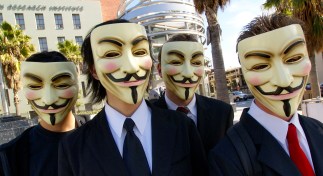 The computer hacking group Anonymous issued a joint statement with LulzSec on Wednesday encouraging users of PayPal to close their accounts in protest at the arrest in the US last week of 16 alleged members of Anonymous.
The computer hacking group Anonymous issued a joint statement with LulzSec on Wednesday encouraging users of PayPal to close their accounts in protest at the arrest in the US last week of 16 alleged members of Anonymous.
Of the 16, 14 are suspected of being connected with the denial-of-service attacks on PayPal late last year, which followed the online money-transfer site’s decision to suspend the account of Wikileaks. The whistle-blowing website was described in the joint statement as “a beacon of truth in these dark times.” More arrests in relation to cyberattacks were made on the same day in the UK and the Netherlands.
The statement said that members of Anonymous and LulzSec were “outraged at the FBI’s willingness to arrest and threaten those who are involved in ethical, modern cyber operations.” It continued: “Many of the already-apprehended Anons are being charged with taking part in DDoS attacks against corrupt and greedy organizations, such as PayPal.”
The statement suggests PayPal users take their business elsewhere: “We encourage anyone using PayPal to immediately close their accounts and consider an alternative. The first step to being truly free is not putting one’s trust into a company that freezes accounts when it feels like, or when it is pressured by the U.S. government. PayPal’s willingness to fold to legislation should be proof enough that they don’t deserve the customers they get. They do not deserve your business, and they do not deserve your respect.”
It asks those who act upon its suggestion to “tweet pictures of your account closure, tell us on IRC, spread the word. Anonymous has become a powerful channel of information, and unlike the governments of the world, we are here to fight for you. Always.”
Various retweets appearing on the AnonymousIRC Twitter page suggested some people were already closing their accounts: “account has been closed and money given to charity” tweeted one. “Closed my paypal account and donated the $10 I had to the Red Cross,” tweeted another.
With the statement being issued only a few hours ago, it’s too early to say whether it’s going to snowball into something big. If it does, it’ll be interesting to see how PayPal responds as business melts away. We’ll keep you posted.


